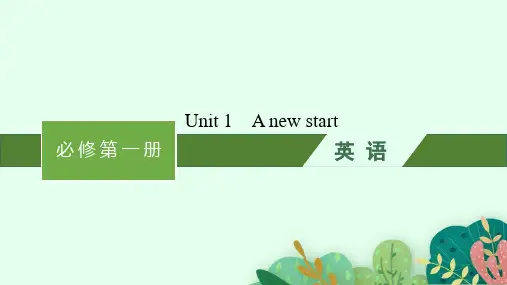外研版(2023)必修第一册Unit 1 A New Start 单词课件(共25张PPT)
- 格式:docx
- 大小:17.67 KB
- 文档页数:5









外研版(2023)必修第一册Unit 1 A New Start Starting out课件(共25张PPT,内嵌视频)(共25张PPT)B1U1A new start新外研Period1 Starting out单元环节By the end of the class, I am able to...learn some emotional words to show my feelings on the first day of senior high.tell the difference between domestic and western high schools. mentally prepare myself for what challenges I will meet at senior high life. know how to survive senior high with tips given by the teacher.01 Activity1New words02 Activity2The differences03 Activity3Questionare04 Activity4Group workCONTENTPeople have a deep___________(印象) on our school gate when they see it. Besides, our_____(校园) is beautiful with green trees and flowers. Activity 1impressioncampusWhen we became a senior high school student,we are all _________(好奇的) about our school's everything.curiousThe yearly gala is the_________(传统) of our school.traditionOur school has good________(设备), for example, we can use Seewo equipment in our lessons.facilitiesHere are our canteen食堂, buffet小卖部and dormitary宿舍.This is your first week at Senior High, and this is the schedule. How do you feel about your new schooldelightedcalmnervousfrightenedconfidentproudexcitedcuriousHow did you feel on your first day at senior highHow do you feel about your new school中国高中生VS米国高中生Activity 2How is this school different from our schooladvanced curriculafulfilling timetableboarding lifedistinctive school uniformsclosed-off school managementconcentrated studyimpressive clubstense testsDomestic senior highKing Alfred's SchoolMy friend Teddy sent me a vedio. Watch and tell the differences between our school and King Alfred’s school.QuestionsJNMiddle SchoolKing Alfred’s SchoolWhen class begins How many classes a day How long does a class last Whenisclass over in the morning When is the lunch time When is the school over When do the young go to the secondary school 扩充词汇量The limits ofone'slanguage mean the limits ofone'sworld.secondary school=junior high+senior highstate school=public schoolprivate schoolpupil学生subject科目curriculum课程catering餐饮well-equippedkitchen设备齐全的厨房snack 点心school uniform校服no trainers不穿运动鞋sculpture雕塑registration 注册tutor导师assembly集会announcement告示QuestionsJN Middle SchoolKing Alfred’s SchoolWhen class begins 7:20How many classes a day 8How long does a class last 45minutesWhenisclass over in the morning 11:35When is the lunch time from11:35 to When is the school over 17:10When do the young go to the secondary school The differences between JN Middle School and King Alfred’s School8:454one hour and fifteen mimutes11:1512:5515:1012 years old11 years oldIn Britain, young people start secondary school at the age of 11 when they go into Year 7.They stay at school until they are 18. Most young people go to state secondary schools. King Alfred's School is a typical state school in a small town called Wantage. It has about 1,8000 pupils. A typical day begins with pupils arriving for classes which start at 8:45. Most young people live in the town and walk or bike to school. There are more than 10 school buses for those who live further away. Atthis school, there are four classes every day. Each class lasts one hour and fifteen minutes, with many different subjects on the curriculum. Including maths, English, science, French, art, physical education or PE, drama, information and communication technology-ICT and catering. King Alfred's SchoolCatering is another subject which allows students to carry out practical work. The school has well-equipped kitchens in the class so that the students can make and taste their own food. The first two classes stop at 11:15 when there is a break for 25 minutes. Students have a quick snack and catch up with their friends. All pupils must wear a school uniform until the age of 16, no trainers. In the art class, students are making sculptures. Their work helps make the school look interesting and beautiful. Lunch is at 12:55 and pupils can buy a hot meal or sandwiches or can bring something to eat from home. Registration is at 1:35 until l:55, which gives the students time to spend with their class tutors or go to assembly to hear school news and announcements. There is one class after lunch. The last class ends at 3:10 and while some students go to one of the many after school activities and clubs, most make their way home.Complete thequestionnaire.1.Share your answers with the class.2. Talk about whatimpressedyou most Activity 3the school campusnew teachersschool subjectsa new timetablethe facilitiesnew friendsyourfeelingsthe foodyour Talk about what impressed you most.Chose one and share with your groupmates.Report to the eful expressionsI felt…on my first day at senior high, because…My first impression of my new school is that…… was the first person I have got to know.I like… most about my new school,because…What I like most about my new school is……For me, I think… is the most impressive about senior high, because…the school campusnew teachersschool subjectsa new timetablethe facilitiesnew friendsyour feelingsthe foodyour HomeworkWrite5 sentencesabout the most impressivething or person the first day in senior high.Possible version:My new school is very good. The teachers are very friendly, and the classrooms are amazing. Every room has a computer with a special screen. The teachers write on the computer, and their words show on the screen behind them. The screens also show photographs, text and information from websites. They’re wonderful!PThank you!。


外研版(2023)必修第一册Unit 1 A New Start 单词课件(共25张PPT)
(共25张PPT)
Unit1
words and expressions
20. panic / p n k/ n. 惊慌,恐慌
in panic 惊慌地
21. challenge / t l nd / n/v. 挑战
challenge to do sth 挑战做某事
22. pressure / pre (r)/ n. 压力
press v.
under pressure 在压力之下
23. calm /kɑ m/ adj. 镇静的,沉着的
keep calm 保持镇静
24. description /d skr p n/ n. 描述
describe
25. confident /'k nf d( )nt/ adj.有信心的,自信的confidence n. 信心
26. poster /'p st / n. 海报
27. badminton /'b dm nt n/ n. 羽毛球
28. drama /'drɑ m / n. 戏剧
29. band /b nd/ n. 乐队,乐团
30. debate /d 'be t/ n./v. 讨论,辩论
debater n. 辩论者
31. gym /d m/ n. 体育馆,健身房
32. piano /p ' n / n. 钢琴
33. stage /ste d / n. 舞台,阶段
on stage 在舞台上
34. photography /f t ɡr fi/ n. 摄影photograph / f t ɡrɑ f/ n. 照片
35. inner / n (r)/ adj. 内部的,内心的
在小酒馆(inn)里说出内心的(inner)真实想法
36. am/a.m./AM 午前,上午
pm/p.m./PM 午后,下午
37. argue / ɑ ɡju / v. 争论,争辩
argue with sb 和某人争论
argue about sth 争论某事
38. topic / t p k/ n. 话题,题目,主题
39. sharp / ɑ rp/ adj. 敏锐的,聪明的
40. dinosaur [ da n s (r)] n. 恐龙
41. dolphin [ d lf n] n. 海豚
42. intelligent / n tel d nt/ adj. 有智慧的,聪明的intelligence n. 智力;理解力
artificial intelligence (AI) 人工智能
43. investigate / n vest ɡe t/ v. 查明,调查
investigation n. 调查;调查研究
穿着(in)背心(vest)来踢(ti)大门(gate),这是要“调查”(investigate)啥呢?
44. various / ve ri s/ adj. 各种各样的
vary v. 变化
vary from...to... 从...到...变化
45. volunteer / v l n t (r)/ n.志愿者
46. gain /ɡe n/ v. 获得,得到观点,看法
in one’s view = in one’s opinion 在某人看来
eg. In my view, things won't change.
It's great to enjoy the view of the bay in the starlight.
54. former / f rm r/ adj. 从前的
55. graduate / ɡr d ueit/ v. 毕业
graduation n.
graduate from 毕业于
eg. It has been 3 years since he graduated from college.
56. orientation / ri n te n/ n.
(新学期或学习课程开始前一段时间的)培训,迎新
Orientation Day 迎新日
57. frightened ['fra t( )nd] adj. 受惊吓的,害怕的
fright n. 惊吓,害怕
frighten v. 使惊吓,使害怕
58. sight /sa t/ n. 看到,看见
night
at the sight of 一看见...
at first sight 乍一看,初次见到
59. figure ['f g ] v.认为
figure out 弄明白,计算出
60. go all out 全力以赴,竭尽全力
61. select /s lekt/ v. 挑选,选择
selection n. 挑选;被选中者
62. particular /p t kjul (r)/ n. 细节
in particular 尤其,特别
63. rainbow / re nb / n. 彩虹
64. neat /ni t/ adj. 好的,令人愉快的
65. specific /sp s f k/ adj. 具体的,特定的specifical adj. 特殊的,明确的
specifically adv. 特殊地,明确地
66. refer [r f (r)] v. 参考,查阅
refer to 参考,查阅
refer-referred-referred-referring
67. journal / d n( )l/ n. 日记,日志,定期刊物
68. struggle / str ɡ( )l/ v. 挣扎,斗争
struggle against/with 和…作斗争
struggle for 为…作斗争
struggle to do sth 努力做某事
69. memorise [ mem ra z] v. 记住,熟记memory n. 记忆
70. skateboarding [ ske t b d ] n. 滑板运动
71. forward [ f (r)w (r)d] adv. 向前
look forward to 期待,盼望
look forward to + n./pron./ doing
72. committee [k 'm ti] n. 职员会
73. improve [ m pru v] v. 提高,改善improvement n. 改善,提高
improve my spoken English 提高我的英语口语
74. rate [re t] v. 对...评估
75. performance n. 表演
perform v.
76. exchange [ ks't e nd ] v. 交换
eg. We exchange ideas and learn from
each other.。